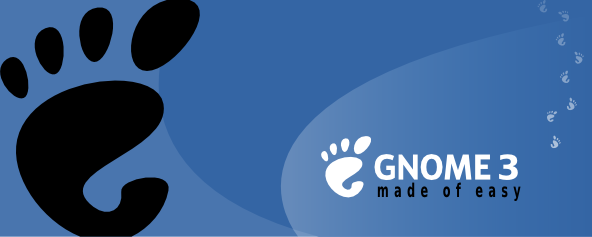With all the buzz around GNOME 3, I really wanted to try it out for real on my main laptop. It usually runs Debian Unstable but that’s not enough in this case, GNOME 3 is not fully packaged yet and it’s only in experimental for now.

I asked Josselin Mouette (of the pkg-gnome team) when he expected it to be available and he could not really answer because there’s lots of work left. Instead Roland Mas gently answered me “Sooner if you help”. 🙂
First steps as a GNOME packager
This is pretty common in free software and for once I followed the advice, I spent most of sunday helping out with GNOME 3 packaging. I have no prior experience with GNOME packaging but I’m fairly proficient in Debian packaging in general so when I showed up on #debian-gnome (irc.debian.org) on sunday morning, Josselin quickly added me to the team on alioth.debian.org.
Still being a pkg-gnome rookie, I started by reading the documentation on pkg-gnome.alioth.debian.org. This is enough to know where to find the code in the SVN repository, and how to do releases, but it doesn’t contain much information about what you need to know to be a good GNOME packager. It would have been great to have some words on introspection and what it changes in terms of packaging for instance.
Josselin suggested me to start with one of the modules that was not yet updated at all (most packages have a pre-release version—usually 2.91—in experimental, but some are still at 2.30).
Packages updated and problems encountered
(You can skip this section if you’re not into GNOME packaging)
So I picked up totem. I quickly updated totem-pl-parser as a required build-dependency and made my first mistake by uploading it to unstable (it turns out it’s not a problem for this specific package). Totem itself was more complicated even if some preliminary work was already in the subversion repository. It introduces a new library which required a new package and I spent a long time debugging why the package would not build in a minimalistic build environment.
Indeed while the package was building fine in my experimental chroot, I took care to build my test packages like the auto-builders would do with sbuild (in sid environment + the required build-dependencies from experimental) and there it was failing. In fact it turns out pkg-config was failing because libquvi-dev was missing (and it was required by totem-pl-parser.pc) but this did not leave any error message in config.log.
Next, I decided to take care of gnome-screensaver as it was not working for me (I could not unlock the screen once it was activated). When built in my experimental chroot, it was fine but when built in the minimalistic environment it was failing. Turns out /usr/lib/gnome-screensaver/gnome-screensaver-dialog was loading both libgtk2 and libgtk3 at the same time and was crashing. It’s not linked against libgtk2 but it was linked against the unstable version of libgnomekbdui which is still using libgtk2. Bumping the build-dependency on libgnomekbd-dev fixed the problem.
In the evening, I took care of mutter and gnome-shell, and did some preliminary work on gnome-menus.
Help is still welcome
There’s still lots of work to do, you’re welcome to do like me and join to help. Come on #debian-gnome on irc.debian.org, read the documentation and try to update a package (and ask questions when you don’t know).
Installation of GNOME 3 from Debian experimental
You can also try GNOME 3 on your Debian machine, but at this point I would advise to do it only if you’re ready to invest some time in understanding the remaining problems. It’s difficult to cherry-pick just the required packages from experimental, I tried it and at the start I ended up with a bad user experience (important packages like gnome-themes-standard or gnome-icon-theme not installed/updated and similar issues).
To help you out with this, here’s a file that you can put in /etc/apt/preferences.d/gnome to allow APT to upgrade the most important GNOME 3 packages from experimental:
Package: gnome gnome-desktop-environment gnome-core alacarte brasero cheese ekiga empathy gdm3 gcalctool gconf-editor gnome-backgrounds gnome-bluetooth gnome-media gnome-netstatus-applet gnome-nettool gnome-system-monitor gnome-system-tools gnome-user-share baobab gnome-dictionary gnome-screenshot gnome-search-tool gnome-system-log gstreamer0.10-tools gucharmap gvfs-bin hamster-applet nautilus-sendto seahorse seahorse-plugins sound-juicer totem-plugins remmina vino gksu xdg-user-dirs-gtk gnome-shell gnome-panel dmz-cursor-theme eog epiphany-browser evince evolution evolution-data-server file-roller gedit gnome-about gnome-applets gnome-control-center gnome-disk-utility gnome-icon-theme gnome-keyring gnome-menus gnome-panel gnome-power-manager gnome-screensaver gnome-session gnome-settings-daemon gnome-terminal gnome-themes gnome-user-guide gvfs gvfs-backends metacity mutter nautilus policykit-1-gnome totem yelp gnome-themes-extras gnome-games libpam-gnome-keyring rhythmbox-plugins banshee rhythmbox-plugin-cdrecorder system-config-printer totem-mozilla epiphany-extensions gedit-plugins evolution-plugins evolution-exchange evolution-webcal gnome-codec-install transmission-gtk avahi-daemon tomboy network-manager-gnome gnome-games-extra-data gnome-office update-notifier shotwell liferea epiphany-browser-data empathy-common nautilus-sendto-empathy brasero-common Pin: release experimental Pin-Priority: 500 Package: * Pin: release experimental Pin-Priority: 150
The list might not be exhaustive and sometimes you will have to give supplementary hints to apt for the upgrade to succeed, but it’s better than nothing.
I hope you find this useful. I’m enjoying my shiny new GNOME 3 desktop and it’s off for a good start. My main complaint is that hamster-applet (time tracker) has not yet been integrated in the shell.
 You’re eager to start contributing to Debian, your first action is to subscribe to some high-profile mailing lists (like
You’re eager to start contributing to Debian, your first action is to subscribe to some high-profile mailing lists (like  I have this project in my head, I want to work on it but I always lack the time. In order to go forward, I thought I could write about it, at least it would let me clarify my ideas and the core goals. So here I am, I will present you
I have this project in my head, I want to work on it but I always lack the time. In order to go forward, I thought I could write about it, at least it would let me clarify my ideas and the core goals. So here I am, I will present you